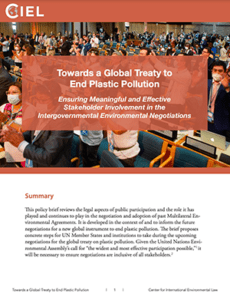
Following the United Nations Environment Assembly’s adoption of a mandate to negotiate an international, legally binding instrument to end plastic pollution entitled “End plastic pollution: towards an international legally binding instrument,” it is essential to prepare the work for the intergovernmental negotiating committee (INC). The INC is tasked with discussing and finalizing the objective, scope, obligations, and mechanisms supporting the new international treaty.
The negotiating mandate calls for the “widest and most effective participation possible,” explicitly acknowledging the participation of potential future parties, representatives from international organizations and bodies, and “relevant stakeholders.” Meeting the ambitious objective will require meaningful pathways for full and active engagement of all participants, not just States. Therefore, it is essential to examine how non-State actors typically engage in negotiations, what guidance the mandate offers for groups that include Indigenous Peoples and waste pickers, and the specific considerations that should be employed to further stakeholder participation.
Towards a Global Treaty to End Plastic Pollution: Ensuring Meaningful and Effective Stakeholder Involvement in the Intergovernmental Environmental Negotiations focuses on the legal aspects of public participation by examining the rules governing previous intergovernmental negotiation processes and lessons that can be extrapolated from the negotiations and operation of Multilateral Environmental Agreements (MEAs). It examines provisions in the negotiating mandate and ways to strengthen procedures for public participation during negotiations, concluding with recommendations for States and international institutions.
Read the recommendations for states, international organizations, and bodies.
(Published on May 17, 2022)
